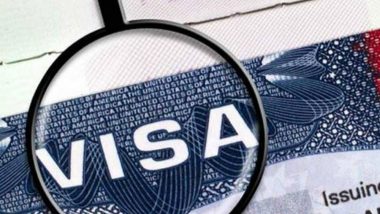Washington, April 27: The United States has imposed sanctions against Pakistan for not accepting the deportees of Pakistani-origin or those who have overstayed their visa tenure in the US. Although the Consular Relations remain unchanged for now, officials have confirmed that visa may be denied to Pakistanis in the near future.
The denial of visas will cover all section of Pakistanis, including the most senior of state officials. The stern action against Islamabad could be taken under the Federal Register notification dated April 22, which has listed Pakistan among nations who are violating the international norms by not accepting the deportees. H-1B Visa: Canada Opens Doors For Skilled Indian Workers, Pegged to Overtake US
Pakistan is the 10th nation to join the list of nations against whom America has either imposed a visa ban or is mulling over the stern decision. Ghana made the list earlier this year. The other countries include Guyana in 2001, the Gambia in 2016, Cambodia, Eritrea, Guinea, and Sierra Leone in 2017, Burma and Laos in 2018.
Under Section 243 (d) of the Immigration and Nationality Act, the Secretary of State is required to discontinue granting immigration or non-immigrant visas to a nation upon receiving notice from the Homeland Security Secretary that the country has denied or is unreasonably delaying accepting a citizen, subject, national or resident of that country.
The State Department tried to downplay the impact of the sanctions on Pakistan. "Consular operations in Pakistan remain unchanged,” a State Department Spokesperson told PTI when asked about the federal register notification.
“This is a bilateral issue of ongoing discussion between the US and Pakistani governments and we are not going to get into the specifics at this time,” the spokesperson added.
Former Pakistan's Ambassador to the US, Hussain Haqqani, feels that this will make things difficult for Pakistanis.
“This measure will create hardship for Pakistanis who want or need to travel to the US and could have been avoided if Pakistani authorities had not ignored American requests to respect their legal requirements for deportation,” Haqqani told PTI, days after the federal register notification. He added that Pakistan's refusal to accept it's citizen deported from the US is not new.
“Pakistan's refusal to accept every Pakistani citizen deported from the US is not new. It seems that the US is no longer willing to overlook a wide range of official Pakistani behaviour. Bonhomie has been replaced by sanctions and restrictions based on Islamabad's policy decisions,” Haqqani said.
While the law in this regard has been under existence since 1996, it is only in last several years that there had been increasing demand from lawmakers towards its enforcement against countries that had refused to accept deportees and visa over-stayers.
In the last few years, India has been taking such deportees on special planes at regular intervals.
The Trump administration after coming to power had said that it will strictly enforce such provisions by denying visas to people from those countries that refuse it accepting deportees and visa over-stayers.
While section 243 (d) of the Immigration and Nationality Act was used only twice before 2017, the Trump Administration has been effective in using this provision on many countries, including Pakistan.
However, the State Department federal register notification indicates that the number of visa denial under this sanction is far less.
Since the law was modified to cover non-immigrant visas in 1996, 318 visa applicants have been affected, the notification said.
“During this same time period, tens of millions of aliens have received non-immigrant visas including, collectively, millions of applicants from the 10 countries affected,” the notification said.
The Federal Register notification said that there is no set formula, though, notably State has never issued a blanket refusal for visas from the country in question.
“For some countries, sanctions begin by targeting officials who work in the ministries responsible for accepting the return of that country's nationals with escalation scenarios that target family members of those officials and potentially officials of other ministries and then other categories of applicants if initial sanctions do not prove effective at encouraging greater cooperation on removals by the targeted government,” the notification said.
(With PTI inputs)
(The above story first appeared on LatestLY on Apr 27, 2019 04:32 PM IST. For more news and updates on politics, world, sports, entertainment and lifestyle, log on to our website latestly.com).













 Quickly
Quickly


